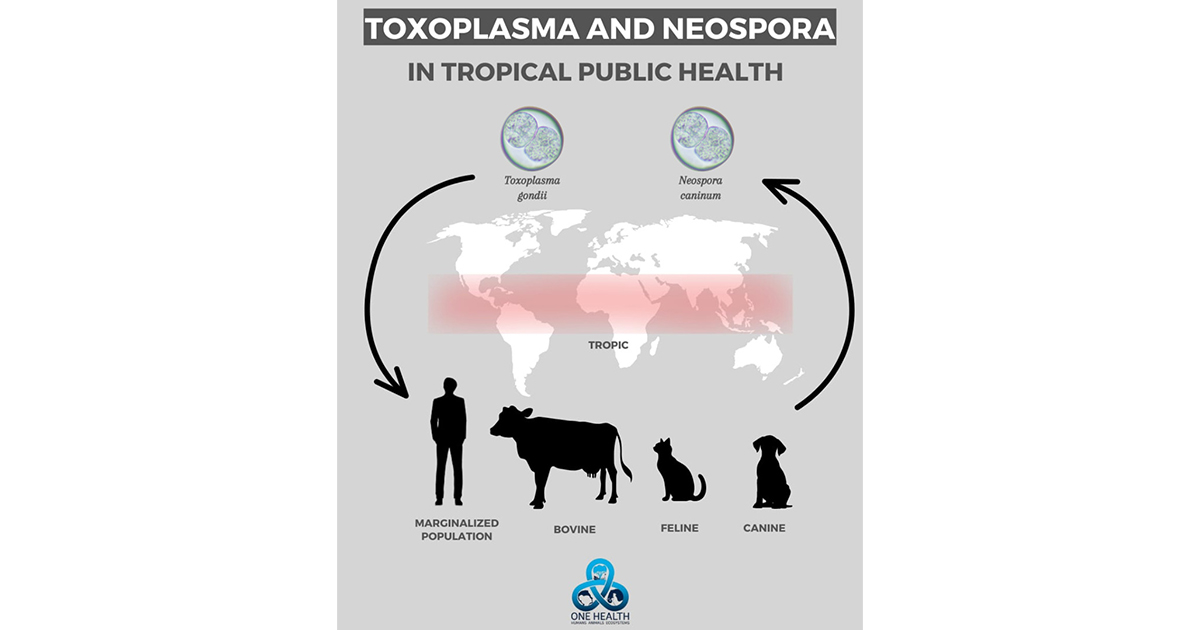- 2.6Impact Factor
- 4.7CiteScore
- 21 daysTime to First Decision
Toxoplasma and Neospora: Public Health Challenges in Tropical Regions
Special Issue Information
Dear Colleagues,
Toxoplasma gondii and Neospora caninum are globally distributed protozoan parasites, posing significant health challenges worldwide. While their impact is widespread, tropical regions present unique epidemiological, environmental, and socio-cultural factors that contribute to their persistence and profound public health implications for both human and animal populations. T. gondii is a leading cause of foodborne zoonoses and congenital infections, while N. caninum is one of the most important causes of reproductive losses in livestock. Warm climates, diverse host species, and often limited control measures further favor their spread and impact in these areas.
This Special Issue aims to gather cutting-edge research and comprehensive reviews addressing the epidemiology, pathogenesis, diagnosis, prevention, and control strategies of these protozoa, with a specific focus on tropical regions. We particularly welcome contributions that highlight the role of One Health approaches, molecular and serological surveillance, wildlife reservoirs, socio-cultural risk factors, and innovative interventions tailored to tropical contexts. By integrating multidisciplinary perspectives, this collection seeks to advance understanding and provide actionable insights to reduce the burden of these infections on human and animal populations in the tropics.
Dr. Thais Ferreira Feitosa
Dr. Vinícius Longo Ribeiro Vilela
Guest Editors
Manuscript Submission Information
Manuscripts should be submitted online at www.mdpi.com by registering and logging in to this website. Once you are registered, click here to go to the submission form. Manuscripts can be submitted until the deadline. All submissions that pass pre-check are peer-reviewed. Accepted papers will be published continuously in the journal (as soon as accepted) and will be listed together on the special issue website. Research articles, review articles as well as short communications are invited. For planned papers, a title and short abstract (about 100 words) can be sent to the Editorial Office for announcement on this website.
Submitted manuscripts should not have been published previously, nor be under consideration for publication elsewhere (except conference proceedings papers). All manuscripts are thoroughly refereed through a single-blind peer-review process. A guide for authors and other relevant information for submission of manuscripts is available on the Instructions for Authors page. Tropical Medicine and Infectious Disease is an international peer-reviewed open access monthly journal published by MDPI.
Please visit the Instructions for Authors page before submitting a manuscript. The Article Processing Charge (APC) for publication in this open access journal is 2700 CHF (Swiss Francs). Submitted papers should be well formatted and use good English. Authors may use MDPI's English editing service prior to publication or during author revisions.
Keywords
- tropical diseases
- public health
- epidemiology
- One Health
- protozoan parasites
- Toxoplasma gondii
- Neospora caninum
- zoonoses
- animal health
- surveillance
- control strategies

Benefits of Publishing in a Special Issue
- Ease of navigation: Grouping papers by topic helps scholars navigate broad scope journals more efficiently.
- Greater discoverability: Special Issues support the reach and impact of scientific research. Articles in Special Issues are more discoverable and cited more frequently.
- Expansion of research network: Special Issues facilitate connections among authors, fostering scientific collaborations.
- External promotion: Articles in Special Issues are often promoted through the journal's social media, increasing their visibility.
- e-Book format: Special Issues with more than 10 articles can be published as dedicated e-books, ensuring wide and rapid dissemination.

